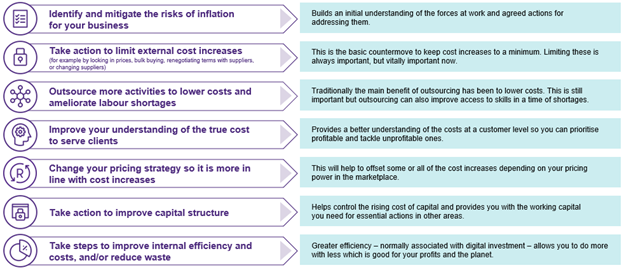-
Digital and Analytics
We have developed distinctive capabilities in digital advisory and data analytics that are key to the success of dynamic organisations.
-
Business Consulting
Our business consulting services help organisations improve operational performance and productivity throughout the growth life cycle.
-
Corporate Finance & Restructuring
We combine our insights and experience to provide a comprehensive range of advisory and corporate finance and restructuring solutions.
-
Internal Audit
Our internal audit service is designed to provide both assurance and consulting assistance on the adequacy and effectiveness of an organisation’s system of internal controls.
-
Business Risk Services
Our service is focused on enabling broader risk coverage and proactive management of risks for the achievement of organisational strategy.
-
Business Process Solutions
We work with a multitude of organizations to improve their finance function efficiency, reduce costs associated with business processes and provide a complete solution to the challenge faced by South African organizations.
-
Programme Assurance & Advisory
Our aim is to protect shareholder value by providing Assurance and Advisory services on change portfolios and large-scale programmes to assist organisations.
-
Forensic Services
Our forensic capability is integrated with our wider advisory services – not an add-on.
-
Cyber Advisory
Our Cyber Advisory service is designed to help you identify, protect, detect, respond and recover from cyber-attacks.
-
IT Advisory Services
We help clients to navigate the complexities and provide you with robust independent assurance that your IT risks, key management priorities and core systems are being appropriately managed.
-
SNG ARGEN
We have a dynamic actuarial team set to assist businesses to comply with the audit standards where actuarial services are required.
-
General Audit
We provide a sound statutory audit of financial statements specialising in both listed entities and state-owned organisations.
-
Financial Services Group (FSG)
The Financial Services Group (FSG) offers specialised audit and advisory solutions to the banking, treasury and financial services sectors.
-
Technical Excellence
We have a well-established specialized technical division, with in-depth, local and international knowledge and experience, which consists of three units namely; Accounting, Audit and Sustainability reporting.
-
Corporate Tax
We offer your business access to a global network of tax specialists in over 130 countries with extensive corporate tax technical skills to provide meaningful advice and adding value to your organization.
-
Value-Added Tax
We can manage your overall exposure to indirect taxes, guide you through complex South African Value-Added Tax (VAT) legislation.
-
Global Mobility
Taxes can be complicated, but the SNG Grant Thornton approach is to assist the new assignee with a clear and easy process.
-
Customs and Excise Tax
Our Customs and Excise team assist traders with driving cost-effective supply chains while maintaining legitimate trade.
-
Tax Technology
This is the lynchpin of our tax audit and advisory approach in making the tax function of our clients effective in data management tools.
-
International Tax & Transfer Pricing
Our team is ideally suited to serve large multinationals and other global companies that need on the ground expertise in multiple jurisdictions, given our extensive network of offices around the globe.
-
Specific Focus Areas
We have a team of dedicated tax specialists with deep knowledge to bring practical and cost-effective tax solutions to our clients and assist entities operating within these sectors to effectively manage their tax needs.
-
Business Consulting
We provide fit-for-purpose solutions to address major challenges the Education sector faces by supporting our clients.
-
Employees’ Tax Services
Its important to ensure that the institution complies with the tax legislation and that all payroll records are accurate and complete.
-
Programme Assurance & Advisory
The need for sound project management and effective solution delivery gives you the edge in competitive markets.
-
Forensic Services
Fraud detection review and forensic investigation for Higher Education
-
Digital and Analytics
The digitalisation of processes within the higher education sector leads to increased data generation. This data can be an essential asset when leveraged correctly.
-
Cyber Security Services
There is no one-size-fits-all security solution to preventing all attacks, but we have cybersecurity strategies that education institutions can use to minimise cyber threats.

-
Sustainable Development Goals (SGDs)
SDG Impact Standards Training Course

These reports outline several key strategies to promote the growth and development of SMEs in the target market.
- - Improving policy-level support is a crucial step.
- - Action plans for value chains and ecosystems must be prioritised to best serve the needs of SMEs.
- - Creating market linkages and platforms to enhance economic transformation.
- - Addressing access to finance is another key strategy.
- - Digitising payments across value chains to increase efficiency and generate a digital transaction history.
To provide further support, the Eswatini MAP SMME Roadmap 2018-2022 report recommends high-quality business development support (BDS) to SMEs, with a particular focus on addressing barriers for women and youth to participate in the economic transformation process. By implementing these recommendations, the target market can foster an environment that is conducive to SME growth and development.
Furthermore, the diagnostic analysis indicated that the majority of SMEs in Eswatini do not use BDS. However, SMEs were found to be hampered by a lack of management or technical skills, the use of sub-optimal technology, limited access to markets and information, and regulatory barriers. Business capabilities are thus critical for the development of SMEs, as they provide the know-how and skills needed to pursue growth opportunities, enter export markets, and promote innovation and competitiveness. The analysis also revealed that some of the business support services provided to SMEs in Eswatini did not meet their needs. The provision of an effective business support system is thus a prerequisite for the success of SMEs in Eswatini.
To negate financial challenges during inflation, mid-market businesses would need to implement short to medium-term strategies. This issue was covered in the H1 2022 IBR report, where we provided guidance on how businesses can respond to inflation and how they can use technology to increase their profit margins.
Some recommended first steps included managing costs carefully and creatively, buying more in advance to lock in prices, hedging where appropriate, and even looking into reverse auctions, while also attempting to become more effective and accomplish more with less. This year, we are adding more action plans that mid-market businesses can use to hedge against inflation as depicted by the graphic below

The mid-market in Eswatini requires coordinated business support that is customer-focused, with organisations that can demonstrate a capability relevant to impacting the SME sector and are accredited to offer such support. SNG Grant Thornton has vast experience and expertise in providing advisory services to businesses going through investment and adoption journeys to ensure growth and assist in finance raising through either private or public listings.


